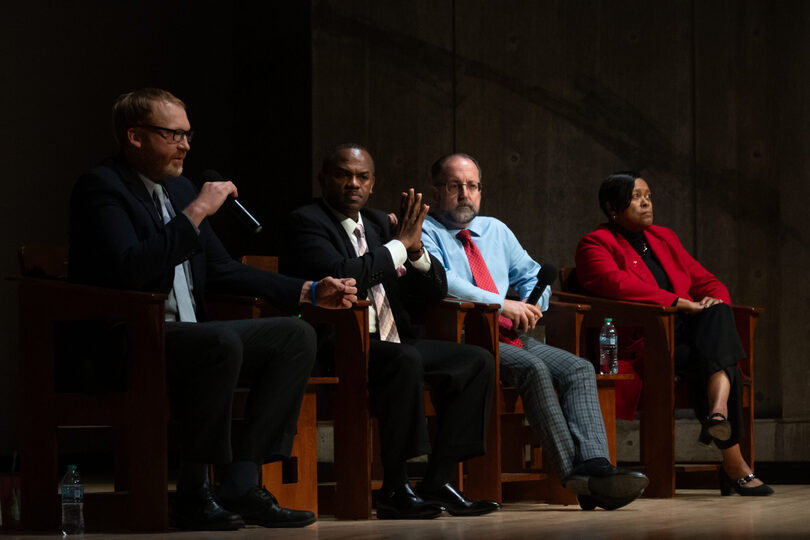Syracuse mayoral candidates mix sharp debates, humor at final forum

Syracuse’s four mayoral candidates talked about plans for their future administrations at a forum Thursday. The candidates answered light-hearted questions and battled out tense exchanges at the last debate before early voting begins Saturday. Maddi Jane Brown | For Central Current
Get the latest Syracuse news delivered right to your inbox.
Subscribe to our newsletter here.
UPDATE: This post was updated at 6:10 p.m. on October 25, 2025.
Candidates for Syracuse’s mayoral race discussed plans for their future administrations between light-hearted questions and tense exchanges at the city’s last mayoral forum before early voting begins Saturday.
The four candidates — Democrat Sharon Owens, Republican Thomas Babilon and independents Tim Rudd and Alfonso Davis — spoke at Central Current’s 2025 mayoral forum held at the Everson Museum of Art Thursday night.
The discussion, segmented into five topics, included introductions, hypothetical scenarios, trivia, questions about policy and a “lightning” round. The session was moderated by Chris Libonati, Central Current’s managing editor, and Patrick McCarthy, the publication’s government and politics reporter.
Rudd started the debate with opening remarks, asking attendees to answer simple math questions such as “What is 1 times 1?” and “What is 0 times 100 million?”
“There’s a variable missing in Syracuse, and I’m going to say it’s heart,” Rudd said. “I’m not going to say that the current administration has zero, but it’s definitely not one.”
Owens, Syracuse’s deputy mayor, highlighted her work for the city under Mayor Ben Walsh’s administration and local non-profits.
Owens, who raised $232,000 by the time she won the primary, is running in a city where 53% of voters are registered Democrats.
“The government came looking for me, because they saw what I was doing, witnessed my work, and witnessed what I’ve been able to accomplish,” Owens said. “I’m proud of my record. I stand on my good work, stand on my character, my integrity and I’m prepared to be your next mayor of Syracuse.”
Davis introduced himself on a platform of economic growth and “hopeless” love for the city.
“We need a direction that is going to allow people in this city to grow from an economic standpoint and a financial standpoint,” Davis said. “Economically doing things perfectly, smart and wise, financially developing and creating businesses sustainably so that they can get help from our city.”
Babilon opened without introducing himself, instead highlighting what he said were “failures” of the Walsh administration: high crime rates, a lack of police officers, the city’s housing crisis and a “budget crisis.”
“If you think that everything is great with the city of Syracuse, then I’m probably not your candidate, because I think that we need change,” Babilon said. “If you believe that we need to make Syracuse a better place, then I’ll ask for you to vote for me this year and give me the opportunity. I will do exactly that.”
During a “trivia” segment, moderators posed questions related to city statistics. Babilon and Owens engaged in a heated argument after Babilon said Owens intends to put tax-exempt properties “in the shadow of I-81.”
The audience erupted in a mixture of applause on behalf of Owens and negative exclamations at Babilon, where some claimed he inappropriately waved a finger in Owens’ face. After the forum, Babilon had an altercation with an attendee, which was separated by Ondonaga County Deputy Sheriffs present at the event.
The rest of the segment continued without argument, where candidates answered questions about fires in vacant properties, Syracuse’s backlog of properties ready for foreclosure and the city’s crime rate drop.
Moderators then posed two questions to candidates about infrastructure, regarding the city’s walkability and bike lanes. Owens defended the city’s sidewalk program, which restores and replaces city sidewalks, and said it needs to be improved to reach as many neighborhoods as possible.
“It’s one of the best things we’ve implemented,” Owens said. “We have to double down, triple down on it so that we can expand it and get to more neighborhoods, more neighborhoods, not downtown.”
Babilon called the program “mismanaged,” saying he would amend the program only to replace sidewalks that need repairs. He also said the city needs to “do a better job” of policing and responding to crime to make people feel safe.
Rudd and Davis both emphasized the need for an urban planner to tackle improving walkability.
Candidates also discussed Good Cause Eviction, a state-level law that says tenants cannot be evicted without a legally recognized reason, and its effects on housing investment.
While Rudd, Babilon and Davis criticized the law, Owens said it “supports keeping people in housing.”
“It encourages increases for landlords that just don’t spike out of control,” Owens said.
Davis said he also supports Good Cause Eviction “a little bit” due to its protection against discrimination, but is wary of letting tenants stay in properties when they don’t pay rent. In Owens’ response, she rebutted Davis’ statement, saying tenants not paying rent is a “good cause,” and they would likely be evicted.
Babilon disagreed, saying he’s against the law because it will dissuade small landlords who don’t want to renew leases to “problematic” tenants, allowing larger corporations to take over local housing.
“Sometimes you have tenants that are problems and they’re not enough of a problem to try to fix,” Babilon said. “What Good Cause Eviction will do is get rid of all the small landlords. They will not be able to keep up with it.”
However, Babilon and Owens agreed on establishing a competitive housing market to combat rising rent. Owens added that creating such a market involves raising rents for people in “quality housing” in incremental percentages, while stifling rent rises on lower-value properties.
“The mirror that we’re looking at is raising rents on slum property,” Owens said. “It is tough because the market is really pushing the rents up in our community.”
Babilon said the city should reinstate vacant apartment buildings, along with adding micro-apartments and tiny homes as more affordable alternatives.
Davis urged capital investment on streets like James Street and Colvin Street to develop a greater quantity of affordable housing. Rudd called rent “a function of supply and demand,” and said the city has ineffective policies that don’t improve the quality of housing.
In a question inspired by multiple attendees at the event, moderators asked how the candidates would replace the city’s lead pipes.
Rudd said he believes the city could replace 60% to 90% of its lead lines in the next eight years, employing the help of contractors and water employees. Davis agreed about using the water department, saying they’re “underutilized and understaffed,” adding he could oversee 60% to 70% of pipes replaced in four years.
Babillon said he would use the city data to prioritize replacing lines affecting low-income households with children.
“It’s really weird to me to go to like Westcott and see them replacing all the lead lines on one street. And then I go to the south side or something, and they’re not doing any kind of work at all,” Babilon said.
Owens said the city is waiting for federal funding from the United States Environmental Protection Agency to continue replacing lead pipes.
In addressing child poverty — where Syracuse has the fourth highest in the nation according to a 2024 census — Davis said he would help develop small businesses in the city, instead of just expanding the I-81 project and Micron in the nearby town of Clay.
“Child poverty doesn’t exist,” Davis said. “Children are hit by osmosis.”
Owens echoed the sentiment of developing the economy, emphasizing the importance of job creation and paying workers a “living wage.”
Babillon said child poverty can be prevented using “tools” that allow children to be successful on “their own merits:” graduating high school, going to college or getting a job and not having children until marriage.
“If you do those three things, (there’s) a 97% chance you will not end up in poverty,” Babillon said. “We need to explain to the children what they need to do to get out of poverty.”
During a scenarios segment, moderators asked candidates to respond to hypothetical situations in one minute. Scenarios included one where the mayor seeks to remove the Syracuse Housing Authority’s executive director but commissioners refuse, and another where U.S. Immigration and Customs Enforcement detains a Syracuse student’s parents.
Owens and Davis agreed they would react to the ICE scenario by contacting resources, including legal representatives. Rudd, however, said he would hand the child over to ICE to be reunited with their parents.
Babilon said a mayor wouldn’t be involved, citing that when a child is left without their parent, it’s left to the role of child protective services.
“Realistically, the mayor’s staff can’t get involved in this, and anybody that says otherwise is just lying to you,” Babilon said. “The mayor is not going to go to their house and find out who their parents are and track them down through ICE.”
In a lightning round, candidates gave one-word answers to fast questions, including someone who they believe is an “overlooked” figure and yes-or-no questions.
The audience erupted in laughter after Owens answered a question asking if the candidates would continue the city’s contract with Flock Safety, a license plate reader company under congressional investigation for its distribution of customer data.
“I have some concerns about it,” Owens said.
Owens, who was a member of a city working group who passed a recommendation of prior approval for SPD’s 26 Flock cameras throughout the city, voted “yes, with stipulation” on the document signed in May 2023.
The lightning round ended with candidates naming who they’d want to win if they lost. Owens and Davis endorsed each other, while Babilon backed Rudd, and Rudd endorsed both Davis and Babilon.
Election Day is Tuesday, Nov. 4. Early voting begins Saturday.





